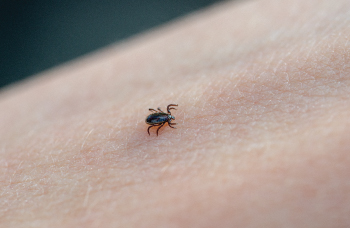Ticks might be one of people’s least favorite creatures. If you find a tick on yourself or your pet, the first reaction may be to squish it or flush it down the toilet, but that tick could help researchers learn more about the parasitic arachnid and its potential to carry disease.
Scientists at Marshfield Clinic Research Institute are asking the public to submit ticks for a research study called the Tick Inventory via Citizen Science (TICS). The study is surveying the distribution of tick species in our area, including any new, invasive ticks that may be moving into Wisconsin. They will also identify the microbes carried by each tick, including pathogens that may cause diseases, such as Lyme disease, anaplasmosis, and babesiosis, and non-pathogenic microbes that may contribute to a tick’s likelihood of carrying disease.
“Ticks are moving into new areas as the environment changes,” said Alexandra Linz, MCRI associate research scientist. “This is an opportunity for Wisconsinites to act as citizen scientists and help us learn about ticks and their diseases, which can potentially help us better inform on disease prevention and early detection as well as develop improved diagnostic tools and treatments.”
The first phase of this survey is targeting the Marshfield area. For more information, or to request a kit be sent to you, contact tics@marshfieldclinic.org, 1-715-389-7796 (extension 16462). Ticks can also be submitted by picking up a pre-paid collection kit from:
- Stanton W. Mead Education and Visitor Center at Mead Wildlife, S2148 County Hwy S, Milladore
- Castlerock Veterinary Hospital, 1214 S. Oak Ave, Marshfield
- Rib Mountain State Park, 149801 State Park Road, Rib Mountain
Once the tick, dead or alive, has been placed in the collection kit, just drop it in the mail to submit. Any tick found on people or pets is appreciated. The study will expand this summer to other parts of the state with collection kits located at additional parks, hiking trails, and veterinary clinics.
Each kit will come with a unique identification number that people can use to look up, via an online dashboard, the species of ticks they contributed.
The Research Institute has long studied ticks and tick-borne diseases, including:
- Improved and rapid diagnostic test evaluation in partnership with industry sponsors.
- Examining and developing a deeper understanding of post-treatment Lyme disease syndrome.
- Evaluation of occupation risks for tick-borne illnesses.
- Exploring changes in land use and its impact on the risk of tick-borne infection exposures.
- Enrolling participants in a national effort to collect samples to improve early Lyme disease diagnosis and treatment.
This tick research, like many research projects at Marshfield Clinic Research Institute, is funded through generous donor support.

